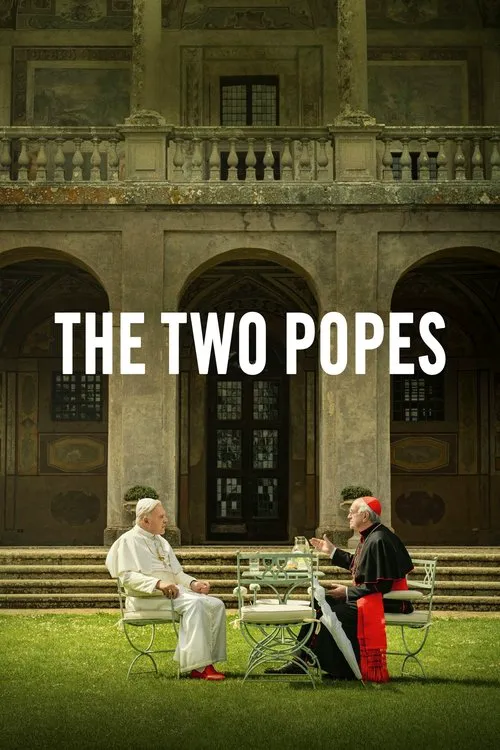The Two Popes

Plot
The Two Popes, a drama film directed by Fernando Meirelles, brings to life a fascinating and lesser-known chapter from contemporary history. The movie is a story about the unlikeliest of friendships between two men: Pope Benedict XVI (played by Anthony Hopkins) and Jorge Mario Bergoglio (played by Jonathan Pryce), who would later become Pope Francis. The narrative revolves around the extraordinary meeting of the two papacies in 2013 and the events that led up to their historic encounter. The film begins in Argentina, where a young Bergoglio is shown as a devout priest working in the slums. However, due to his liberal views, he faces skepticism from both the Catholic establishment and the government. Cut forward to 2012, where Cardinal Bergoglio has been elected Pope as Pope Francis, marking the first time a Jesuit has taken the papal throne. Back in the Vatican, Pope Benedict XVI is facing unprecedented pressure due to his handling of the sex abuse scandal. His efforts to reform the church have been hamstrung by resistance from other high-ranking officials. The once-introspective Pope has hit a self-doubt barrier and begins questioning whether he has the strength to lead the Catholic Church through this tumultuous period. He reaches out to Cardinal Bergoglio in a bold move, requesting permission to step aside, but ultimately, Pope Francis persuades him to continue in the role. However, during the 2013 papal conclave that takes place in the Vatican, Pope Benedict XVI surprises everyone with the unprecedented decision to resign as Pope, the first pontiff to do so in nearly 600 years. This decision opens the door for the election of a new Pope, as Jorge Mario Bergoglio emerges from behind the curtains. Meanwhile, an old and weary Pope Benedict XVI is struggling with feelings of guilt, regret, and doubt due to past failures and the pressure to reform the church. After a long period of contemplation, Pope Benedict chooses to reveal an extraordinary secret that would shake the foundations of the church. It is during this time that the film reveals an unexpected friendship blossoming between the old pontiff and the new. Pope Benedict invites Pope Francis to the Vatican for dinner, sparking an unlikely bond over dinner as both popes explore their experiences, hopes, and fears. This newfound friendship provides a respite from the weight of responsibilities that both men have to bear. While their bond grows deeper, Pope Benedict decides to reveal a secret, which has been weighing heavily on his heart. The secret is that he has discovered a way to reform the Vatican more quickly and effectively than Pope Francis, but with one catch: it involves removing certain high-ranking officials. Torn between doing what is right and the potential consequences, Pope Francis struggles to reconcile the integrity of the church with Pope Benedict's wishes. As their bond deepens, the friendship becomes a beautiful reflection of hope, forgiveness, and redemption. In a surprising turn of events, Pope Benedict reveals that he has discovered documents that suggest his predecessor, Pope Pius XII, had a closer relationship with Hitler than anyone had ever imagined. This shocking revelation would not only shatter the legacy of the Vatican but also the very foundations of the church. However, in a bold move, Pope Francis refuses to act on the documents, choosing to preserve the integrity and dignity of the church instead. As their meeting comes to a close, Pope Benedict takes his leave, handing Pope Francis a set of keys symbolizing the passing of the torch. The film concludes on a poignant note, capturing the essence of the remarkable bond that formed between the two Popes. In a world torn apart by conflict, politics, and division, the two Pontiffs offer a beacon of hope, reminding us of the power of forgiveness and compassion in the face of adversity. Directed by Fernando Meirelles, the film is a masterful adaptation of the memoir by Tony and Peter Sebnik's "The Pope" with beautiful cinematography, outstanding performances, and exceptional storytelling. The Two Popes serves as a compelling reminder that true leadership is not about power but about serving the greater good, and the legacy that will be left behind.
Reviews
Recommendations




